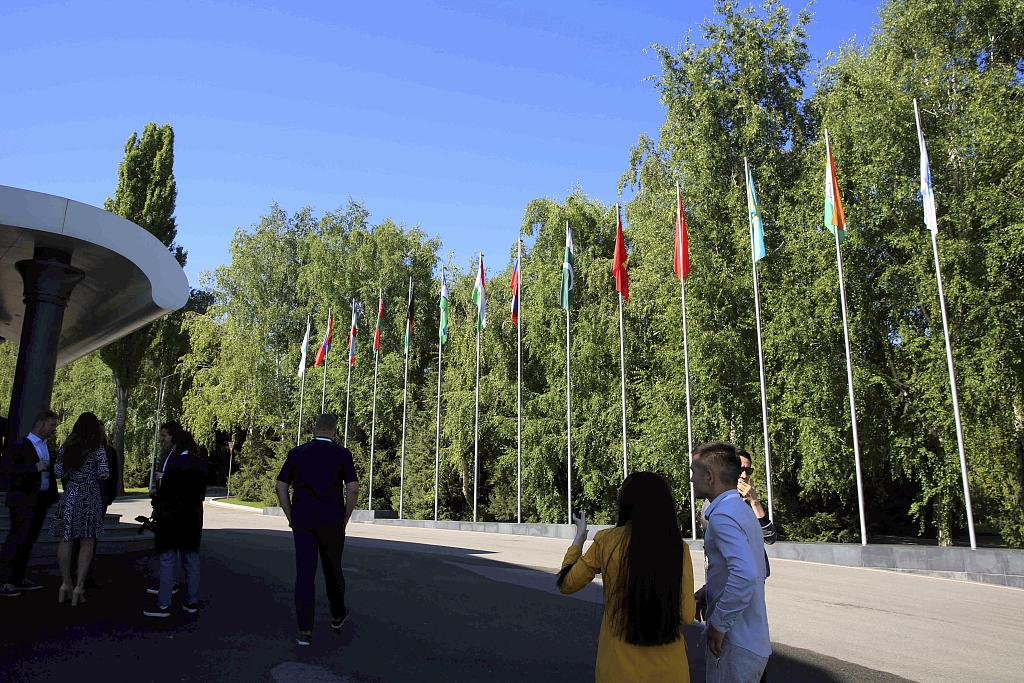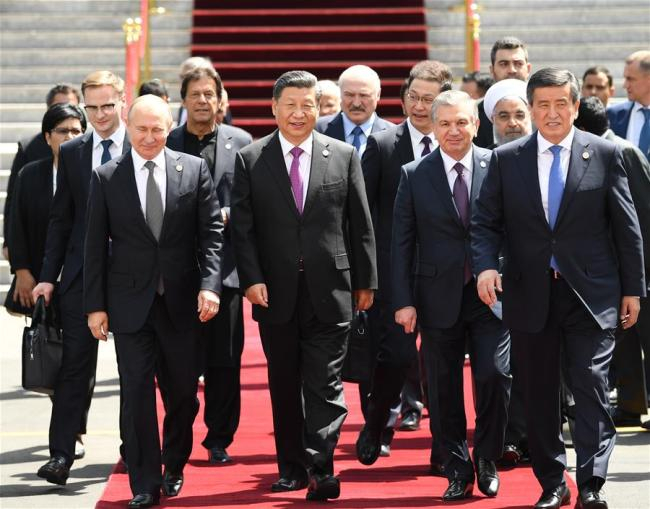

Editor's note: The following is an edited translation of a commentary that was first published on the Chinese-language website "Commentaries on International Affairs." The translation first appeared on China Plus on June 15. The article reflects the author's views, and not necessarily those of CGTN.
In his speech at the 19th Shanghai Cooperation Organization (SCO) summit in Kyrgyzstan, Chinese President Xi Jinping has called on SCO members to build a closer community with a shared future by developing the group into a model organization representing inclusiveness and mutual learning, a paradigm that highlights unity and mutual trust, underscores the sharing of weal and woe, and stresses mutual benefit and win-win results.
This is another proposal put forward by President Xi for the organization's blueprint, demonstrating China's consistent support and the leading role in the group. The proposal also entrusts new implications under the current trend in accordance with the changing global and regional situations.
To develop the SCO into a model organization that highlights unity and mutual trust is of great significance, particularly amid the rising friction being caused by global competition and increasing geopolitical maneuvering.
The national conditions, culture and development among SCO members are diversified. But it's unity and trust that enhances the organization's development. Trust is the best "adhesive" in international relations. Developing the SCO into a model organization highlighting unity and mutual trust is helpful for decreasing a growing deficit in global trust.
The sharing of weal and woe is a way to create a safe and stable environment for regional development. The SCO itself was originally established for security cooperation, and has largely been able to achieve that mandate. However, SCO countries still face challenges such as terrorism, drug-related crimes and information insecurity.
As such, President Xi has stressed that the SCO members need to hold fast to the concept of common, comprehensive, cooperative and sustainable security, take multiple measures to combat the "three forces" of terrorism, separatism and extremism, and enhance de-extremization cooperation. China is willing to continue to provide assistance within its abilities in the peaceful reconstruction in Afghanistan, which shows China's strong sense of responsibility to maintain regional stability.

Chinese President Xi Jinping (2nd L, front) and other leaders of the Shanghai Cooperation Organization (SCO) member countries and observer states, as well as representatives of regional and international bodies, head for group photos during the 19th meeting of the Council of Heads of State of the SCO in Bishkek, Kyrgyzstan, June 14, 2019. /Xinhua News Agency
Building the SCO into a model organization that stresses mutual benefit and win-win results reflects SCO members' demand for their own development. The SCO accounts for over one-fifth of global GDP, enjoys great potential in resources, population and economic vitality. The economic growth of all members in recent years has slowed due to the international financial crisis and global trade frictions, so their willingness to enhance regional cooperation has become even stronger.
President Xi called on SCO members to advocate for the multilateral trading system, the maintenance of an open world economy, a further synergy of the Belt and Road Initiative with other development strategies, as well as regional cooperation initiatives such as the Eurasian Economic Union, while at the same time, adhering to a goal of innovation-driven development.
China is willing to set up a model base for training and exchanges among SCO members in agricultural technology in northwestern Shaanxi Province. All these proposals meet the demands of SCO members to maintain their development. Data shows that by the end of 2018, China's total investment in SCO member countries hit 86.2 billion U.S. dollars, covering various sectors such as agriculture, manufacturing and infrastructure construction.

A China-Kazakhstan logistics base in Lianyungang, Jiangsu Province. /VCG Photo
To build the SCO into a paradigm in inclusiveness and mutual learning means creating a long-term impetus for the development of SCO. The SCO now has eight full members, four observers and six dialogue partners. Their ethnicities, religions and cultures vary from one to another.
Noting this, President Xi called on member countries to deepen cooperation in areas such as culture, education, tourism, sports and media. He also called for cooperation at local levels to create more people-to-people exchanges.
These proposals are helpful in promoting mutual learning and amity among cultures and creating inclusive development in the region. As a comprehensive regional organization that includes almost half of the world's population, the SCO is committed to building a closer community of shared future, which is of great significance in coping with increasingly common challenges, while safeguarding multilateralism and international rules.
(If you want to contribute and have specific expertise, please contact us at opinions@cgtn.com.)

Copyright © 2018 CGTN. Beijing ICP prepared NO.16065310-3
Copyright © 2018 CGTN. Beijing ICP prepared NO.16065310-3